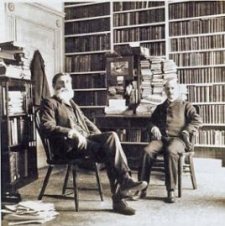The Legacy of B. B. Warfield
 Thursday, June 26, 2008 at 07:34PM
Thursday, June 26, 2008 at 07:34PM  Part One –The Legacy of B. B. Warfield
Part One –The Legacy of B. B. Warfield
(Note: This is the first in a new series on B. B. Warfield, taken from my Ph.D. dissertation, "The Lion of Princeton")
During his thirty-four year reign as the ranking theologian at Princeton Theological Seminary, Benjamin Breckinridge Warfield (1851-1921) exerted tremendous influence upon much of American Presbyterianism. With his lucid pen and his passion to defend the Westminster Standards, there was little doubt about where Warfield stood on most every subject he addressed.
Even some eighty years after his death all one need to do is but mention his name in certain circles and you are sure to get a reaction, pro or con. A number of those who have interacted with Warfield view him as a kind of brilliant but nevertheless obscurantist fundamentalist (cf. James Barr, Beyond Fundamentalism, Westminster, 1984, 141) or a thorough-going rationalist , who supposedly invented the notion of biblical inerrancy (Alister McGrath, A Passion for Truth: The Intellectual Coherence of Evangelicalism, InterVarsity, 1996, 169). When viewed from this perspective, Warfield's most enduring legacy is to be seen in his important but misguided efforts in the heated controversy over the nature of biblical authority that dominated American Presbyterian circles in the latter part of the nineteenth century.
To read the rest of this article, Click here: Riddleblog - The Legacy of B. B. Warfield


Reader Comments (4)
John Lofton, Editor
TheAmericanView.com
JLof@aol.com